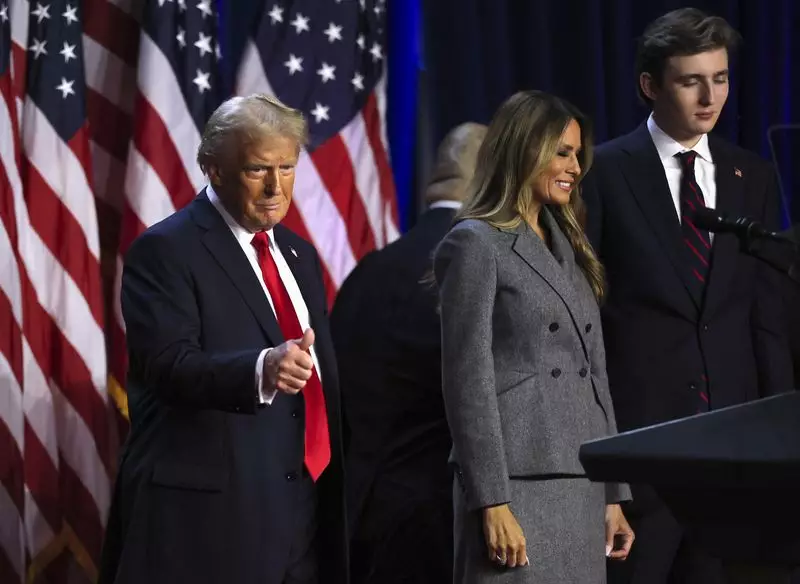As the political landscape in the United States shifts with the ascension of Donald Trump to the presidency, China stands on alert, anticipating a prolonged period of rivalry marked by economic contention, technological competition, and security negotiations. This recent electoral achievement for Trump, though expected by Chinese analysts, introduces a series of strategic uncertainties and potential challenges for China’s global ambitions.
Anticipations and Apprehensions
Chinese policymakers had observed the pre-election climate with a sense of trepidation. The outcomes of the election, with Trump securing a broader voter base than in his previous term, signal not just a political mandate but a continuation of trends that jeopardize Sino-American relations. Experts like Tong Zhao from the Carnegie Endowment for International Peace argue that while a Trump victory intensifies competition, it also opens pathways for China to capitalize on the potential gaps in U.S. foreign policy.
There is an air of inevitability in the Chinese discourse regarding Trump’s foreign policy stance, largely characterized by isolationism. This could create scenarios where Beijing pursues a more assertive international agenda, taking advantage of the perceived retreat of American influence. “Although this outcome poses challenges, it was not entirely surprising,” Zhao states, suggesting that Chinese leadership might adopt a dual strategy of maintaining a cordial façade while intensifying its own power projection.
Trump’s history of utilizing tariffs as a political weapon looms large in the considerations of China’s leadership. With proposals to impose tariffs exceeding 60% on Chinese imports, the prospect of an escalated trade war weighs heavily on Beijing’s economic strategy. The economic ties that bind the two nations—amounting to over $400 billion in exports from China to the U.S.—are precarious, making the specter of a trade conflict particularly alarming.
Experts note that such tariffs, coupled with a dissolution of China’s favored trading status, could exacerbate the internal challenges already faced by the Chinese economy. Da Wei from Tsinghua University warns that Trump’s unpredictability complicates Beijing’s strategic planning, pushing Chinese authorities to ready their economic defenses. “It’s difficult to predict how to respond when Trump announces new policies,” he asserts, highlighting the challenge of uncertainty in international affairs.
In response to these pressures, analysts suggest that China may double down on efforts to achieve technological autonomy and work more closely with allies like Russia. This pivot towards self-reliance is not merely a reaction to Trump’s threats, but a broader strategy aimed at safeguarding its future economic viability.
The election outcome presents a unique opportunity for China to reinforce its relationships with nations across the Global South, Europe, and Northeast Asia. With Trump adopting a transactional and isolationist foreign policy, Chinese analysts see a chance for their country to fill the gaps left by a retreating United States.
Recent developments, such as a warming relationship between China and India, are indicative of a potential shift in regional dynamics. Additionally, as Xi Jinping’s administration reaches out to new leadership in Japan, it aims to mitigate years of geopolitical tension. Zhao notes that as the U.S. might withdraw from its international commitments, creating a vacuum, it provides China the leeway to extend its influence, especially among emerging markets that are often overshadowed by Western dominance.
Taiwan remains a crucial point of contention in U.S.-China relations. With Trump’s posture suggesting limited support unless Taiwan were to increase its financial contributions towards its defense, the delicate balance of power in East Asia is at risk of escalation. The Biden administration’s more supportive stance toward Taiwan, including military arms sales, generates complex challenges for Beijing, which perceives the island as a breakaway province.
An increase in American military presence and arms sales not only heightens tensions but also complicates the strategic calculus for China’s leadership, as they gauge their responses amidst an environment that appears increasingly hostile. As Shen Dingli, an international relations scholar in Shanghai, observes, “The inconsistencies in U.S. policy towards Taiwan under different administrations add to the unpredictability that China must navigate carefully.”
Trump’s re-election could lead to heightened tensions between the U.S. and China, marking a complex phase in global geopolitics. China’s leadership faces the challenge of adapting its strategies in the face of economic pressures and political uncertainties, while also seeking to exploit the shifts within the international landscape to bolster its own influence. The coming years will serve as a litmus test for both nations, as they navigate through an evolving framework of competition and cooperation on the world stage.

